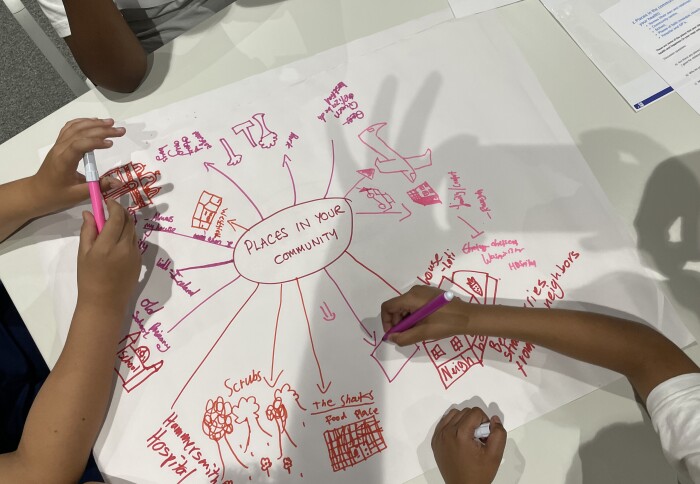The Undergraduate Major Care Training Unit visited a neighborhood faculty to help their curriculum and encourage pupils to contemplate healthcare careers.
Widening entry to healthcare professions is a key precedence of the Division of Major Care and Public Well being. The latest publication of Well being Training England’s ‘Coaching the Future GP’ report (2023) locations a brand new emphasis on rising well being inequalities and the necessity to practice socially accountable GPs who’re higher geared up to grasp and handle the wants of their native communities. By rising range, we incorporate a broader vary of views, experiences and cultural insights that may improve the standard of affected person care by selling cultural competence, empathy and understanding.
Due to this fact, when a neighborhood faculty invited us to help their science week, we jumped on the alternative. The varsity is situated within the borough of Hammersmith and Fulham, a various group dealing with challenges of revenue and well being deprivation (5/10 on the Index of A number of Deprivation). We noticed a possibility to not solely help the varsity’s STEMM curriculum, but additionally for pupils to work together with docs to grasp our position and the importance of main care, and we aimed to encourage the pupils to contemplate a future profession in group healthcare.
Working in partnership with the native main faculty academics and with Steph Powell (Neighborhood Collaboration Lead for the Undergraduate Major Care Training Unit), Sukhi Ubhi (Coordinator for the Medical Training Innovation and Analysis Centre) and Sian Powell (College Growth Lead), we co-designed and delivered a half-day workshop for 26 faculty pupils aged 10 to 11 with reference to ‘Wholesome Hearts’.
We designed a collection of quick, interactive and fascinating stations for the pupils on subjects such because the anatomy and physiology of the circulatory system the place pupils explored 3D coronary heart fashions, and accomplished drawings and worksheets. Pupils took half in an interactive whole-class demonstration on how blood flows via the human physique’s circulatory system. We accomplished the session with small group workout routines exploring how blockages within the circulatory system develop and the impression this has on the physique.
Pupils measured one another’s coronary heart fee, oxygen saturation and blood strain with bedside tools utilized by GPs comparable to peripheral pulse oximeters and blood strain displays. They had been capable of discover the impression of train after doing a collection of star-jumps. Pupils additionally participated in a simulated role-play of a affected person attending their native GP observe with signs and indicators of a coronary heart assault. They assisted the GP of their evaluation of the affected person on this role-play and organized secure switch to hospital by calling an ambulance, gaining an understanding of the position of a GP in an acute emergency.
When the simulated affected person returned to their GP observe three weeks later, pupils helped the GP advise the affected person on well being promotion, which helped them to grasp the position of a GP in holistic care and illness prevention. Lastly, pupils created posters to show in GP observe ready rooms to speak key messages to the area people on wholesome meals decisions. Every group offered their poster and defined the reasoning behind their decisions and the way these may enhance the well being outcomes of the broader group.
Given the multicultural native populace of Hammersmith and Fulham, we tailor-made the workshop content material in order that it was partaking and inclusive for the youngsters. We ensured that inclusive language was used throughout the spectrum of language talents and studying variations, and we supplied dietary data on varied cultural diets that they may use for his or her affected person posters.
The workshop concluded with a Q&A session the place it turned clear that the pupils, regardless of their younger age, had been conscious of and engaged with up to date media protection of the NHS. They requested us what we considered the junior docs’ strikes, and enquired as to how a lot docs are presently paid. We had been additionally inspired to share the explanation why we had chosen to turn into docs, permitting us to speak our enthusiasm and keenness for the career, regardless of the systematic difficulties it’s presently dealing with. We had been, subsequently, capable of problem a number of the media misrepresentations of docs, offering a extra optimistic perspective on the worth of being a health care provider in at the moment’s NHS.
Our main purpose had been to coach primary-school kids in regards to the position of GPs in sustaining the well being and well-being of the group, and this achievement was mirrored in suggestions from the pupils; 68% of whom felt that the session had modified their understanding of what a GP does. A number of pupils additionally expressed an curiosity in a profession in medication following the workshop. The instructor’s suggestions was additionally overwhelmingly optimistic, telling us that we had impressed the pupils to broaden their concepts of what careers may very well be doable for them and that the pupils had been nonetheless “fortunately recounting the actions from the day” per week on from the workshop.
Personally, we felt proud to ship a session that was geared toward introducing pupils, at a younger age, to careers they could not have thought-about beforehand. Witnessing the pupils’ pleasure and engagement with the session not solely renewed our consciousness of the methods we are able to contribute to the communities we function healthcare professionals, out and in of medical settings, but additionally gave us hope that, regardless of all the current challenges, the way forward for medication is in secure fingers.
Names and roles of authors:
Sian Powell (College Growth Lead, Undergraduate Major Care Training Unit, Imperial School London)
Faye Maxwell-Carr (GPST1, Imperial VTS)
Amina Mirza (GPST1, Central Middlesex VTS)
Aaliya Mohammad (GPST1, Imperial VTS)


